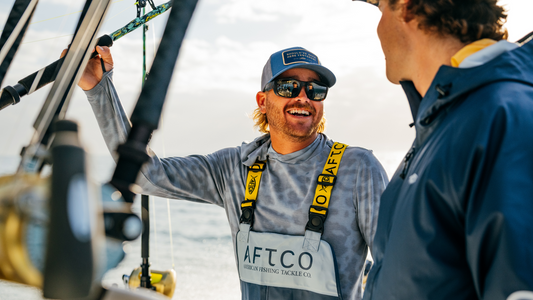
HRI’s Shark Researcher Tool
AFTCO has partnered with CCA and HRI to help launch HRI’s Fin Finder, an interactive map that focuses on apex shark tracking and research, using science to make sharks personal, exciting, and accessible, focusing on youth engagement.
HRI's Shark Researcher Tool - Where Science Meets the Ocean
One of HRI's most well-known projects aired on Discovery Channel's Shark Week was the Return of the Monster Mako in June 2016. Mako sharks are fascinating because of their dramatic feeding behavior and ability to breach the water at high speeds while hunting their prey. However, there are several unknowns about Mako sharks, including their habitat needs.
To learn more about Mako sharks, a team of experts from HRI's Center for Sportfish Science and Conservation set out on a weeklong expedition to tag and study 1,000+ pound Mako sharks feeding off the coast of Southern California. The HRI crew used the "Shark Eye 2," a state-of-the-art instrument with front and rear cameras with night vision, to learn more about Mako shark behavior. Before this project, no other teams had attached cameras to Makos to track their movement, speed, depth, and day-to-day behavior. With this new technology at their disposal, scientists could document, study, and compare the predation behavior of Pacific Makos to the Makos in the Gulf of Mexico.

Bubba, the male Shortfin Mako Shark pictured above, was tagged in the Gulf of Mexico on February 24, 2021. This mature life-stage shark weighed an estimated 240 pounds and was 8.4 feet long.
Dr. Greg Stunz, CSSC Director and HRI Chair for Fisheries and Ocean Health, said,
"We know that shark populations are decreasing worldwide due to overfishing and other threats. We are seeing bright recovery spots in many areas, but we still have a long way to go."
Shark tagging works because each tag is attached to the fin that pings when it surfaces and tracks the shark in real time. The information and data about the shark’s movements are uploaded to a digital map from the tag. As part of HRI’s partnership with AFTCO and CCA, millions of shark fans can now follow these sharks and see where they are in real time through HRI’s Shark Researcher tool.

With shark tagging, researchers have also had success observing Mako shark behavior at artificial reef sites off the Texas coast. These artificial reefs are made from a combination of sunken ships and current or decommissioned oil and gas platforms, attracting prey of all kinds. Artificial reefs like these have become a hot spot for Mako sharks with abundant prey at their disposal. By using the data collected from satellite tagging and continuing to build artificial reefs, researchers hope to restore shark populations to healthy levels.
HRI has made great strides in learning more about Mako shark behavior. However, their work is only possible through support and donations from other programs and conservationists looking to make a positive impact. By everyone doing their part to help protect and conserve our ocean, Mako sharks and all the species who call the ocean home will be around for generations to come.
The Truth About the Shark Problem
Sharks generally have difficulty winning popularity contests among saltwater anglers, but they are a critical part of the marine ecosystem. As apex predators, they help maintain the balance of marine life by regulating populations of other species and keeping the entire aquatic chain in check. However, if you’re an angler, particularly in the Gulf or Southeast United States, you’ve likely noticed an increase in sharks devouring released fish or taking a fish right off a line. Are there more sharks than ever? Or have they learned where to score a quick meal? Click here to learn more about the truth behind the shark problem.
See HRI's Fin Finder in Action
![]()
About HRI
Rooted in generosity and conservation, the Harte Research Institute was founded by local conservationist and newspaper publisher Ed Harte. HRI aims to have a positive, lasting impact on the Gulf of Mexico’s ecosystems, economies, and communities. From an idea and a donation, HRI has since grown to a $15 million international research institute supporting nine different research programs run by 135 researchers, staff, and students. HRI has worked to ensure a sustainable Gulf of Mexico ecologically and economically for the last two decades through solutions anchored in science. This year, AFTCO has partnered with the Harte Research Institute, which tirelessly contributes to the well-being and sustainability of our oceans. HRI is known for its shark tagging efforts and has been featured several times on Discovery Channel’s Shark Week.
About CCA
A group of outdoor enthusiasts and recreational anglers started the Coastal Conservation Association to conserve our coastal environments and marine resources. Since its founding in 2015, CCA has
- Fought to keep Bluefin tuna off the endangered species list.
- Supported and expanded finfish hatchery programs
- Protected against unfair fishing regulations.
- Helped fight against fishing tackle and lead bans.
CCA’s goal is to protect your freedom to fish by conserving and enhancing the availability of coastal resources to the public. To get involved, consider becoming a CCA member or attending an event to benefit the future of fishing and coastal conservation.





